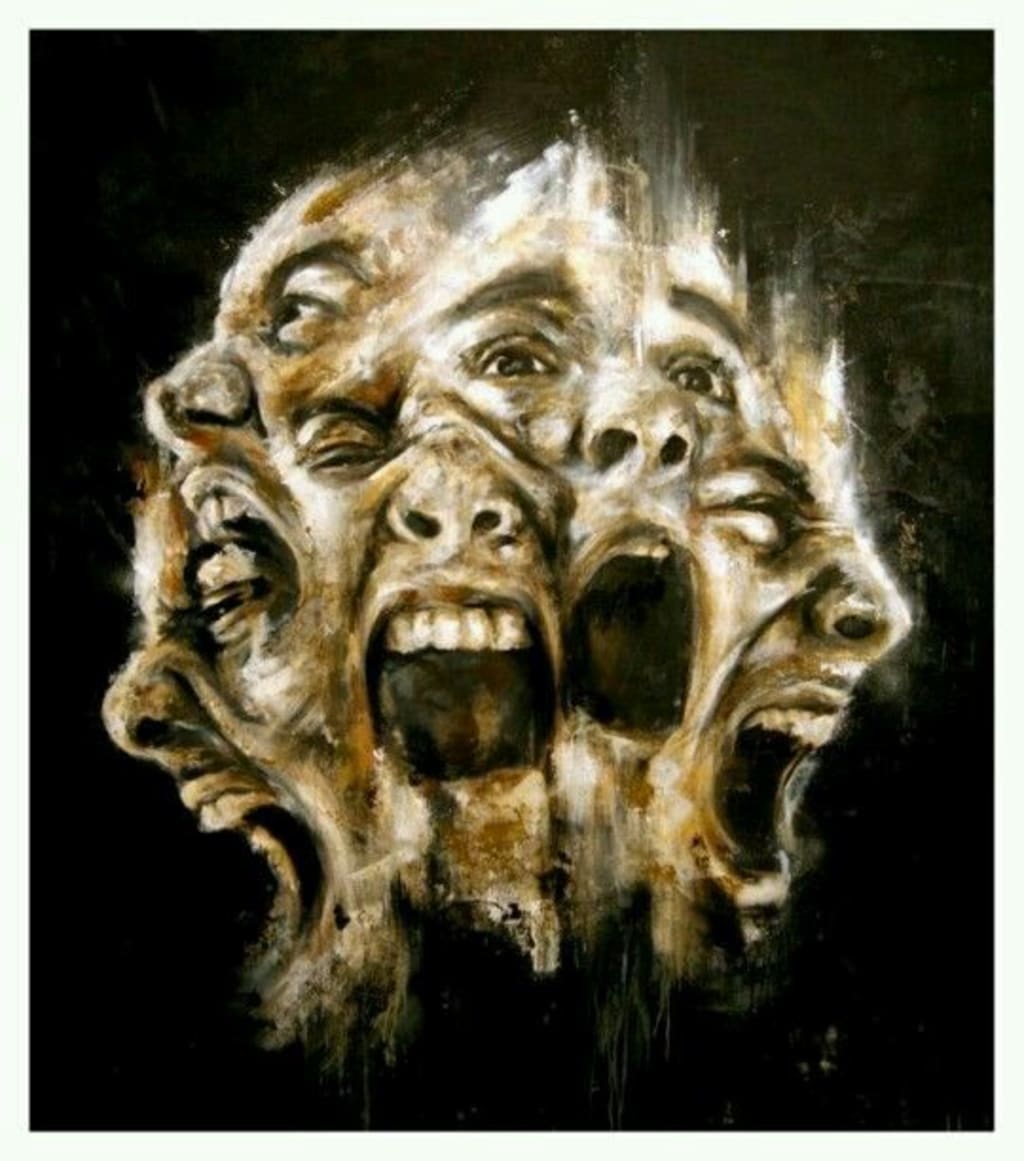A Guide to BPD
Part One: Why Do They Behave Like This?

I've never been quiet about my mental health, while I haven't been as open as I am now, I've never made a conscious effort to hide it. However, there are many people that I know who fight specifically to prevent people from finding out about their diagnoses. I'm hoping my writing this will help them be honest with themselves and their loved ones, but also help those close to them understand and accept who they are no matter what their issues are.
I have Borderline Personality Disorder (also known as Emotionally Unstable Personality Disorder), it was first suggested that I could be diagnosed with this about five years ago by a psychiatrist that was overburdened, underpaid, and uninterested in his patients. At 19, it wasn't something that I had ever heard of, and that's saying something because I'd been misdiagnosed with loads of different disorders and syndromes. I refused to take the diagnoses seriously, after all, borderline sounded ridiculous and my psychiatrist of the time didn't do a particularly good job explaining it to me. After getting pregnant with my daughter and moving to Norfolk, I was referred to another mental health team. They told me that the BPD was a definite. They couldn't explain it particularly well, they said, because there are too many symptoms and has too many different ways of presenting itself, so I did my research. I read medical studies about the effects of medication, I read every book I could find on the subject and watched as many films depicting BPD as I could find.
I learned quite a lot about it, but the most surprising is that it's actually an incredibly common mental health disorder, particularly among women. We don't know if the uneven diagnosis rates are due to men being less likely to seek help, or if it's just not looked for as much, but the traits are actually presented fairly evenly in both sexes.
Living with BPD is bloody difficult. Many people misunderstand it or buy into the Hollywood based stigma, claiming it's either not a proper mental health disorder or that we all must be manipulative, crazy, uncaring, people with no sense of empathy or guilt. None of these things are true. The most common and accurate description of borderline personality disorder that I've heard, compares it to a severe nerve condition. During a nerve condition of this type (Eg, CRPS), your nervous system is hyper-aware of every single touch or twinge of pain you feel. So it's all magnified by ridiculous amounts. BPD, is like a severe nerve condition, but for your emotions. It's a never-ending, emotionally draining, exhausting disorder.
I hope I can help you understand it and how to handle it a little better.
The Symptoms:
Borderline Personality Disorder has many different symptoms, most of which we don't realize are occurring at the time.
1. Impulsive or Self Destructive Behaviours
These symptoms are linked quite deeply and can be in a variety of ways. BPD usually presents with these behaviors if the sufferer is particularly angry or upset about something. It could be spending money that was earmarked for bills on something silly or unnecessary. Getting a sudden hair cut or color change, a new facial piercing, or even tattoo. However, these are not the worst of the behaviours. It may also lead to the sufferer engaging in harmful or attention-seeking behaviour, such as risky sex, driving recklessly, or taking silly risks with their health or safety. The sufferer beforehand often shows no interest in whatever they impulsively/self-destructively do.
After suffering with BPD for since my youth, and knowing now that BPD is what it is, and how it presents, I can see a lot of dangerous and self-destructive behaviours in my own growth, and more often than not appears to be caused by a desperation to receive some form of approval or appreciation. That small flash of approval and fitting in makes a sufferer feel better temporarily, but often doesn't last, which leads to further dangerous or impulsive behaviours.
2. Fear of Abandonment
These fears often go back to childhood, trauma, and invalidation are often the root of a disorder like BPD, and such a phobia can lead to terrifying behaviours. Constant re-dials, panic attacks, clinginess, distance, and a volatile swing between hating their loved one, and an unhealthy obsession with them.
The feeling of never being secure within yourself or your relationships with other people is terrifying. It's often one of the main factors in the regular relationship breakdowns that BPD sufferers have to handle. They fear the loss of a loved one so much that it can be physically painful, so they become overbearing, harrassing, and end up calling or texting at 4am and expecting a response immediately. When they don't receive their immediate responses, or if the tone of something doesn't sound quite right, they berate themselves. Their guilt and shame become overwhelming, whatever reason that causes a lack of response must be their fault, and it must mean that you're going to leave them. After all, why wouldn't you? Everyone else does.
3. Unstable Relationships
It's incredibly common for people with BPD to struggling with maintaining their relationships. Often they are volatile, intense, and short-lived. They can fall in love incredibly quickly (within days), and out of love just as quickly. Leading to an overwhelmed person on the other end of such intensity and a feeling of whiplash.
When you deal with emotions as intensely as borderlines too, you're constantly feeling everything, and having such emotionally intense relationships is a direct result of one of the other symptoms emotional oversensitivity. Repeatedly failing relationships often leads to many of the behaviours mentioned in the last point. But also a feeling of worthlessness and self-loathing.
4. Unclear Self Image
Borderline sufferers generally have severe issues with their identity. When attempting to make new friends, they often act like chameleons, taking on the interests and ideals of those around them to attempt to be a more likeable and gain approval.
It's normal to feel frustrated at a BPD sufferer for this sort of behaviour. Maybe they've flip-flopped on a political or scientific opinion, maybe they're suddenly listening to different music, or suddenly crazy about new hobbies. It's also common to feel as though you don't know them anymore. Don't worry. We don't know ourselves either. We try all these different things in a desperate attempt to find something that we can cling to, that helps us to understand who we are. As a result, many of us cling to our diagnosis, simply because there's nothing else about ourselves that we understand or can recognise as "me."
5. Self-Harm
Suicidal thoughts or behaviors and an urge to self-harm are also incredibly common in BPD sufferers. There are reasons, that while rational to us, may not be to you. A combination of factors may lead to self-harming or suicidal thoughts or maybe even an attempt.
Please remember, that we are not actively trying to hurt those around us. We are hurting about something, and our brains are in continual circling chaos, trying to trick us into thinking that we aren't worth anything and wouldn't be missed. A typical thought process just in an hour or two goes like this: "I'm so fat now, no wonder he doesn't want to have sex with me. God, is that what I look like after I've been crying? What did I say?! Why is she mad?! I thought they were my friends, why would they abandon me? They're going to leave. I deserve it. I'm worthless. I'm so ugly. Everyone would be better off if I wasn't here..." And often, we will think many of these things at the same time, within the space of two or three minutes.
6. Extreme Mood Swings
Another common symptom of BPD is the typically known mood or emotional swings. Volatility is our default state of being, we can go between elation and furious rage within an hour, while hitting every single emotion you can think of in between. Often, it doesn't even seem like anything has set off the mood change, it can be a tiny thing, barely noticeable to you. To us, however, the most seemingly insignificant of things—a misunderstood tone, a decline for a hug, or a long wait between text messages—become apocalyptically gargantuan. From there our disorder will take over, twisting an apparently innocent comment, catastrophizing it so that we perceive it as a sign that we, as is often the case, are going to end up abandoned and alone.
7. Chronic Feelings Of Emptiness
Those of us with BPD often discuss a feeling of emptiness. It's almost as though there's a hole or void sitting in our chests where our diaphragm sits. When these feelings hit the extreme, it's common for us to feel as if we're "Nothing" or "Nobody." I have regularly been told by fellow BPD sufferers that it's as if there's nothing in our bodies, like we're just empty shells running on auto-pilot, with no purpose or conscious choice or control in anything we do.
This can lead to some very destructive behaviours, many of us tend to attempt to fill the void in ourselves with things such as drugs, alcohol, sex, binge eating, etc. None of which are satisfying, nor fill the hole, and usually make us just feel worse.
8. Anger Issues
A lot of BPD sufferers talk about suffering from severe anger problems. Whether that be a short temper, or a long fuse but disproportionate reaction to whatever led to a sufferer losing their temper.
Unfortunately, these anger problems and temper snaps can be set off by the most trivial of things. Much like the suicidal thoughts or self-harming urges, we can go from being happy and joking to being blindingly enraged. Like our entire being is submerged in this inferno of pure fury, we see red, and often lose control of our actions or words. Many of us can control these reactions, because we have had to all our lives, but as children, it's unsurprising that many of us got into fist fights during our school years.
9. Disassociation
Disassociation is an inability to connect with reality properly. It generally involves paranoid or delusional thoughts, often leading to being extremely suspicious of our loved one's motives. It sometimes even ends up including hallucinations, particularly if there is low light quality and our imaginations can metaphorically wander off by themselves.
Our disassociations can be scary, but other than making sure we know that you're here for us there's not much that can be done about them. They're a normal part of our disorder, and while they can, it's rare that they have a specific trigger.
I am not, under any circumstances, saying that you should begin to self-diagnose your significant other, friend, or family member. If you or they believe that they may suffer from borderline personality disorder, then they must get professional help from the right sources. Talking to your GP is usually the first step. However, you must be aware that BPD has a severe stigma (as I've briefly mentioned before, and will be going into in more depth about later), and it can end up being a struggle to either get a diagnosis or receive the help they need. While it is common for many of us to end up having to fight with doctors, giving up should never be an option. I know many fellow sufferers who have had to fight for their diagnosis, for example one doctor told someone I know, "You're showing traits of Borderline Personality Disorder, but I do not want to label it," which is actually a surprisingly common line that we're given, and it often takes at least three more appointments of the potential sufferer and their support person actively bullying the doctor, before they actually give in and diagnose.
For the sake of your struggling loved one, please do not give up, it's not productive nor will it help them in any way. Don't let them stop the fight, no matter how difficult it seems, because as stressful as it is to be battling against people who are unwilling to help you, even though that's their job, it is worse to spend your life at the mercy of this disorder. I wouldn't even wish it on my worst enemy.
About the Creator
Kerri Maguire
I'm 24 and the mother of a two year old girl. I suffer from MH issues including BPD, ADHD, Anxiety Disorder and Depression.
My writing will be based around my experiences in life and how I deal with things.






Comments
There are no comments for this story
Be the first to respond and start the conversation.